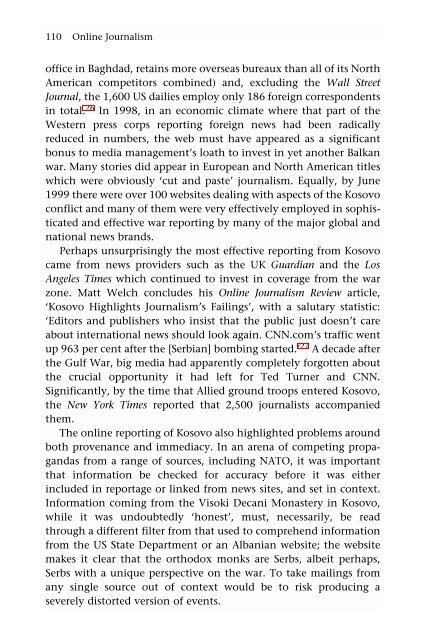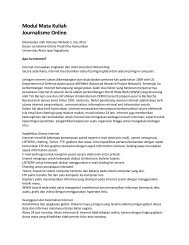Online Journalism - Ayo Menulis FISIP UAJY
Online Journalism - Ayo Menulis FISIP UAJY
Online Journalism - Ayo Menulis FISIP UAJY
You also want an ePaper? Increase the reach of your titles
YUMPU automatically turns print PDFs into web optimized ePapers that Google loves.
110 <strong>Online</strong> <strong>Journalism</strong><br />
office in Baghdad, retains more overseas bureaux than all of its North<br />
American competitors combined) and, excluding the Wall Street<br />
Journal, the 1,600 US dailies employ only 186 foreign correspondents<br />
in total. 26 In 1998, in an economic climate where that part of the<br />
Western press corps reporting foreign news had been radically<br />
reduced in numbers, the web must have appeared as a significant<br />
bonus to media management’s loath to invest in yet another Balkan<br />
war. Many stories did appear in European and North American titles<br />
which were obviously ‘cut and paste’ journalism. Equally, by June<br />
1999 there were over 100 websites dealing with aspects of the Kosovo<br />
conflict and many of them were very effectively employed in sophisticated<br />
and effective war reporting by many of the major global and<br />
national news brands.<br />
Perhaps unsurprisingly the most effective reporting from Kosovo<br />
came from news providers such as the UK Guardian and the Los<br />
Angeles Times which continued to invest in coverage from the war<br />
zone. Matt Welch concludes his <strong>Online</strong> <strong>Journalism</strong> Review article,<br />
‘Kosovo Highlights <strong>Journalism</strong>’s Failings’, with a salutary statistic:<br />
‘Editors and publishers who insist that the public just doesn’t care<br />
about international news should look again. CNN.com’s traffic went<br />
up 963 per cent after the [Serbian] bombing started.’ 27 A decade after<br />
the Gulf War, big media had apparently completely forgotten about<br />
the crucial opportunity it had left for Ted Turner and CNN.<br />
Significantly, by the time that Allied ground troops entered Kosovo,<br />
the New York Times reported that 2,500 journalists accompanied<br />
them.<br />
The online reporting of Kosovo also highlighted problems around<br />
both provenance and immediacy. In an arena of competing propagandas<br />
from a range of sources, including NATO, it was important<br />
that information be checked for accuracy before it was either<br />
included in reportage or linked from news sites, and set in context.<br />
Information coming from the Visoki Decani Monastery in Kosovo,<br />
while it was undoubtedly ‘honest’, must, necessarily, be read<br />
through a different filter from that used to comprehend information<br />
from the US State Department or an Albanian website; the website<br />
makes it clear that the orthodox monks are Serbs, albeit perhaps,<br />
Serbs with a unique perspective on the war. To take mailings from<br />
any single source out of context would be to risk producing a<br />
severely distorted version of events.
















